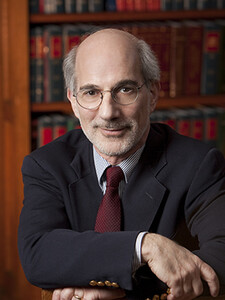Conference Highlights Professor Kahn’s Work

The work and jurisprudence of Professor Paul Kahn ’80 was discussed in a two-day workshop “Law and Political Imagination” on April 7 and 8 co-organized by the Edinburgh Law School Centre for Legal Theory.
Kahn is the Robert W. Winner Professor of Law and the Humanities and Director of the Schell Center for International Human Rights. Four panels of scholars from diverse countries discussed his work.

The two-day workshop included panel discussions titled “Political Theology,” “Constitutional Identity and Case Law Between Interpretation and Narrative,” “The Cultural Study of Law,” and “System and Project.” Each panel included discussion by scholars followed by a reply from Kahn.
“The workshop does not only celebrate Kahn’s impressive work, but it also aims at exploring applications of Kahn’s major ideas to different legal fields,” said Marco Goldoni, Senior Lecturer at University of Glasgow School of Law, another co-organizer of the workshop.
Scholars discussing Kahn’s work include Moshe Halbertal (Hebrew University of Jerusalem and NYU School of Law), Martin Loughlin (London School of Economics), Benjamin Berger (Osgoode Hall Law School), Maria Cahill (University College Cork), Sabine Mair (University of Copenhagen), Marco Goldoni (University of Glasgow School of Law), Antonio Marzal (University of Glasgow School of Law), Signe Larsen (University of Oxford), Denis Baranger (Université Paris II – Panthéon-Assas), Miguel Maduro (Catholic University, Lisbon), Amalia Amaya (Edinburgh Law School), and Or Bassok ’13 LL.M. (University of Nottingham).
On April 11, Kahn presented a separate lecture, “America’s New Civil War,” at Edinburgh Law School sponsored by the Edinburgh Centre for Legal Theory.
Kahn teaches in the areas of constitutional law and theory, international law, cultural theory and philosophy. He is the author of Legitimacy and History: Self-Government in American Constitutional Theory; The Reign of Law: Marbury v. Madison and the Construction of America; The Cultural Study of Law: Reconstructing Legal Scholarship; Law and Love: The Trials of King Lear; Putting Liberalism in its Place; Out of Eden: Adam and Eve and the Problem of Evil; Sacred Violence: Torture, Terror, Sovereignty; Finding Ourselves at the Movies: Philosophy for a New Generation; Political Theology: Four New Chapters on the Concept of Sovereignty; Making the Case: The Art of the Judicial Opinion; Origins of Order: Project and System in the American Legal Imagination; Testimony; and the forthcoming Democracy in Our America: Can We Still Govern Ourselves?


